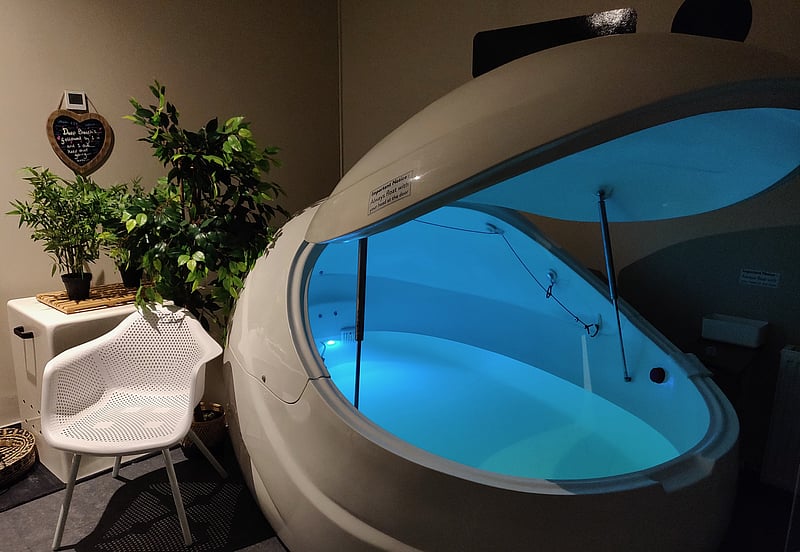Get Healthy!

- Sarah D. Collins
- Posted September 1, 2023
Could 'Float Therapy' Help Ease Anorexia?
Float therapy, where a patient is suspended in a pool of warm, salty water in a soundproof room, could help ease some aspects of anorexia nervosa, a small new study found.
"The idea is that women with anorexia have dysfunctional interoceptive abilities [sensing internal signals from your body], so they're not able to attend to and perceive their bodily experiences in the same way that healthy individuals can,"explained study co-author Emily Choquette, a postdoctoral research associate at the Laureate Institute for Brain Research in Tulsa, Okla. "And one unique thing about floating is that it helps people become more in tune with those body signals."
The research involved 68 women and girls hospitalized for anorexia treatment in a Tulsa clinic; 45 participated in a one-hour float therapy twice per week for four weeks, while the other 23 (the control group) did not. Every participant also received care as usual.
Both immediately after the float therapy, as well as in the six months after therapy, participants showed significant reductions in body dissatisfaction, which was measured by the Photographic Figure Rating Scale. The control group did not show significant changes in body dissatisfaction levels.
"We showed them a series, a validated scale that is composed of 10 different pictures of actual female bodies varying from an underweight to an overweight body mass index. And they pick the body silhouette that most corresponds to how they see their current body, and then they make another choice related to how they want their body to appear, sort of which silhouette they would prefer to have,"said senior study author Dr. Sahib Khalsa, director of the Laureate Institute's Float Clinic and Research Center.
"So in our study, pretty reliably after each float session "¦ instead of seeing their current body as more overweight, they actually picked a body that was more closely related to their actual BMI," he said.
The float therapy also helped diminish anxiety immediately after sessions, though participants' anxiety remained generally unchanged in the six-month follow-up.
The study was published Aug. 29 in the journal eClinicalMedicine.
The Mayo Clinic defines anorexia nervosa as "an eating disorder characterized by an abnormally low body weight, an intense fear of gaining weight and a distorted perception of weight."To prevent weight gain, people with anorexia severely restrict their caloric intake in extreme ways that can include: vomiting after eating, abusing laxatives or exercising excessively. Anorexia has the highest mortality rate of any psychiatric disorder, with approximately 5% of patients dying within the first four years of diagnosis, according to an article in World Psychiatry.
Dr. Victor Fornari, a child psychiatrist at Northwell Health, noted the importance of body perception.
"We know that part of the challenge in recovery from anorexia nervosa is that individuals experience a great deal of body dissatisfaction. Oftentimes it's a trick that their malnourished mind plays on them, where they feel that they're fat when underweight and their anxiety level can be very high," said Fornari, who was not involved with the study.
"And so certainly the challenges of asking individuals to have nutritional rehabilitation and re-feed to gain weight in order to recover is often very challenging and difficult, because their thinking tells them that they shouldn't even though the treatment team says that they should," he said.
Fornari said while the results look promising, patients diagnosed with anorexia should continue usual care and see float therapy as a supplemental treatment.
Typical treatment for anorexia can include hospitalization to treat medical complications that occur from lack of eating, as well as for psychiatric care. Psychotherapy, medical care for co-morbidities, healthy weight restoration, and sometimes medications like antidepressants are usually involved, as well as support from family and friends.
As for why people develop anorexia, "there's no one ideology that we know, unlike the infectious model of strep throat, you have exposure to the Streptococcus bacteria," Fornari explained. "Eating disorders really represent a bio-psycho-social illness where there may be risk factors that put people at increased risk for them. There may be perpetuating factors that continue them, and there may be precipitating factors.
"So we know, for example, a family history of an eating disorder or body dissatisfaction puts people at greater risk,"he noted. "A family history of obsessive-compulsive disorder, family history of serious anxiety, those can be predisposing factors. And then there can be precipitating factors like trauma, and there can be perpetuating factors like living in a family with family violence or serious depression."
More information
For more on anorexia nervosa, visit the National Eating Disorders Association.
SOURCES: Sahib Khalsa, MD, PhD, director, clinical operations, Laureate Institute for Brain Research (LIBR), Tulsa, Okla., associate professor, Oxley College of Health Sciences, University of Tulsa, and director, LIBR Float Clinic and Research Center; Emily Choquette, PhD, postdoctoral research associate, LIBR; Victor Fornari, MD, child/adolescent psychiatry, Northwell Health; eClinicalMedicine, Aug. 29, 2023
